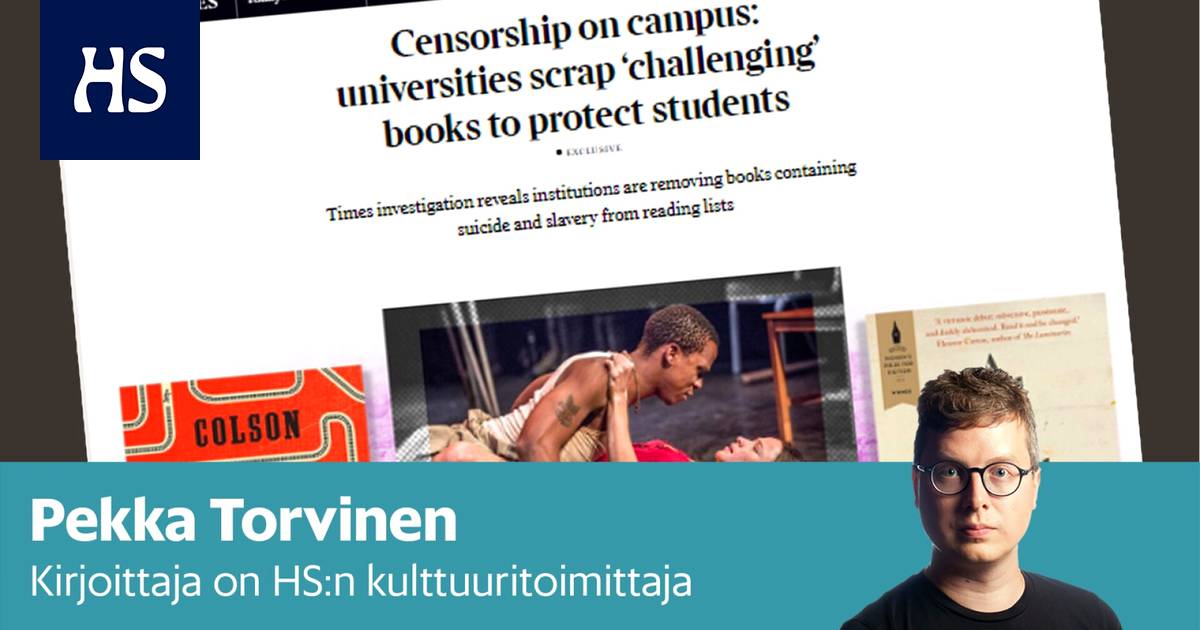The real censorship and culture war is somewhere else than universities, writes journalist Pekka Torvinen.
On Wednesday the British newspaper The Times published a big deal about the “censorship” of the country’s universities. According to the beginning of the story, universities remove books from course reading lists due to “challenging” content and more than a thousand texts, even by William Shakespeare and Jane Austen’s works, content warnings have been added.
For example by Colson Whitehead Underground railway had been “permanently” removed from a course at the University of Essex, according to The Times, because of the book’s raw and detailed depiction of violence and the slave trade.
Another observation was that by August Strindberg a classic play Miss Julie had also been permanently removed from the course at the University of Sussex, according to the newspaper, because the play deals with suicide.
Strindberg’s “denial” caused a minor scandal in the author’s home country of Sweden. For example, the head of the cultural editorial department of Expressen magazine Victor Malm got dizzy.
There was a lot of uproar on British Twitter as well. Horrible! Where is freedom of speech!? The universities have been conquered by the woke plague and left-wing groupthink! Do something!
All completely predictable. So predictable that one could suspect that the story was made precisely because of those reactions.
The Times sent an admittedly impressive number of nearly 300 requests for information to 140 UK universities. According to the newspaper, the investigation was carried out because there have been public statements of concern about universities’ self-censorship, lest students be shocked or hurt.
Always good to find out! However, the explanation is up there.
Yes, with 300 requests for information, The Times discovered that two entire books have been removed from course reading lists. However, the story has been framed and conservative politicians have been interviewed as if the magazine had found evidence of a huge problem.
In addition, the universities that come forward in the middle of the story say that they have been misquoted. Underground railway has been removed from the reading list of one course because another book was considered to be more suitable for the course. Whitehead’s book is still available in the university library and can be freely used in other courses.
Miss Julie -play, on the other hand, has not been removed “permanently”, but temporarily at the request of the students, when their fellow students committed suicide. The play will probably come back to the course next year and it has been available in the university library all along.
That is, first The Times found almost nothing to support its own framing, and in the end even those small findings were something other than what the paper let us understand at the beginning of the story.
How about content warnings, I can already hear you asking. What about them? What’s wrong with telling someone who is just starting to read a book that it might shock them because of the description of this or that horrible thing in detail?
It’s been done this way for a long time with TV series and movies. The recommended age limit is the content warning, as are the content symbols. Spider, can cause anxiety. Needle, includes substance use.
It’s quite strange that no halos ever arise from these.
Teaching methods are also changing. Once upon a time, the University of Helsinki had its own tube where misbehaving students were put. Is no longer. Probably quite a long time, according to someone, it should have been, maybe still. But why should you listen to someone rant about modern nonsense?
of The Times it’s already about dishonest journalism, and it’s a real scourge of culture wars. Claims about the hypersensitivity of university students, self-censorship of universities and political correctness are good headline material. These have also been seen in Finland.
Click, read and squirm to keep the polarization engine running. What does it matter that in the United States specifically the right-wing invented it themselves an enemy and named it political correctness. From there, the same straw spread around the Western world.
What does it matter that the right-wing’s new favorite enemy, i.e. “critical race theory”, is also a fight that one conservative activist developed? An academic theory, but oh, how bad it sounds when repeated to the uninitiated. He who has ears, let him hear!
Sometimes the university world goes wild and a theory or way of speaking can gain a superior position. However, it is part of academic debate that eventually someone or some will challenge the prevailing theories. Nothing is forever.
What about politics? The idea of the Finnish state was developed at the University of Helsinki.
Repeated and usually almost completely unfounded claims about the arrogance of universities sound like the idea of academic freedom has not been internalized somewhere in society. It seems too difficult to realize that course reading lists can vary significantly from year to year. One year there are Strindberg’s writings about suicide, the next not.
On the other hand, one certainly does not even want to internalize academic freedom. It would be nicer to be able to determine from the outside what universities have to do.
To the same At the moment, at least in the United States, there is a real book ban problem. It’s not just created by leftist university circles, but by conservative politicians. They want to remove books about sexual orientation and gender identity from schools in conservative-leaning states.
The state of Florida passed the “Don’t Say Gay” legislation, which prohibits talking about sexual orientation and gender identity in elementary schools.
So, where is the real censorship?
Swedish In the middle of the Strindberg censorship scandal, a brilliant professor of ancient culture was also published by Ida Östenberg column in Dagens Nyheter. In that, Östenberg got to the real problem, i.e. the decline of the humanities. Would we rather talk about that than political correctness, Östenberg asks.
The humanities are in short supply in Britain, Sweden and Finland. What is the use of any reading lists if there are no actual lecture courses, only independent reading and exams?
#Analysis #Times #universities #censor #books #reality #sources #weak #culture #war






/s3/static.nrc.nl/bvhw/files/2024/04/data114733679-a80577.jpg)

